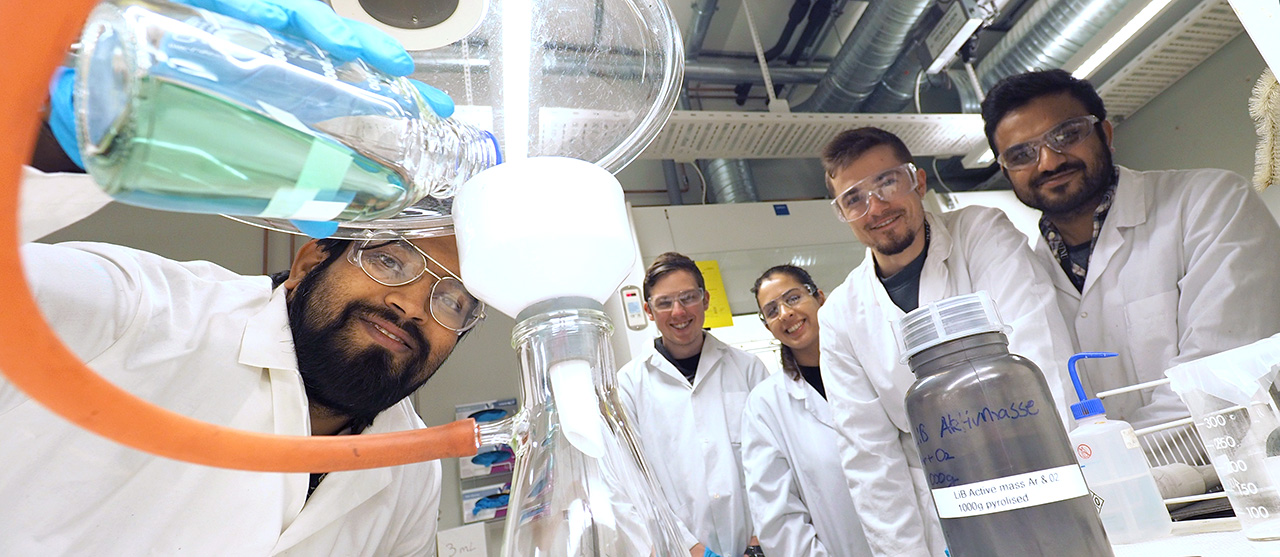HolE-LIB – Developing a Holistic Ecosystem for Sustainable Repurposing and/or Recycling of Lithium-ion Batteries (LIBs) in Norway and the EU
HolE-LIB – Developing a Holistic Ecosystem for Sustainable Repurposing and/or Recycling of Lithium-ion Batteries (LIBs) in Norway and the EU

PhD projects
The research work will involve development of solvents for selective Li recovery at low pH. The focus will be on experimental evaluation of selectivity and extraction performance of selected solvents, experimental characterization of solvent and feasibility study of the process, including possibilities to recycle the solvent.
Department of Chemical Engineering
PhD candidate
Supervisors
This project aims to push for closing the battery materials loop by converting black mass into a mixed metallic product directly suitable for cathode remanufacturing. Using combination of pyro and hydrometallurgy, the focus will be to maximize recycling critical materials towards circular economy and resource efficiency.
Post Doc
Supervisors
Ragnhild Elizabeth Aune
Sulalit Bandyopadhyay
Conference Papers
Olsen, A.M., Bandyopadhyay, S., Arnberg, L., and Aune, R.E., Characterization of Black Mass After Different Pre-treatment Processes for Optimized Metal Recovery, In: TMS 2024 153rd Annual Meeting & Exhibition Supplemental Proceedings, TMS 2024, The Minerals, Metals & Materials Series. Springer, Cham. (2024) pp. 389-408. https://doi.org/10.1007/978-3-031-50349-8_34
Ibrahim, M., Arnberg, L., and Aune, R.E., Understanding the Transformation of Battery-based Black Mass Through Different Pre-treatment Processes, In: Silicon for the Chemical and Solar Industry XVII Proceedings, Trondheim, Norway, September 10-13, 2024
Seminars/Presentation
Aune, R.E., Recycling Li-Ion Batteries (LIBs) - A Crucial Step Towards Sustainability, RMW17 (The 17th Workshop on Reactive Metal Processing), MIT (Massachusetts Institute of Technology), Cambridge, Boston, USA, March 8-9, 2024
Student Projects/Course work
Assessment of Critical Raw Materials Recovery from End-of-Life Electrical and Electronic Products
Peyriller, Lauriane Nathalie Arwen. Exploring the Impact of Pre-treatment Processes on the Characterisation of Black Mass for Enhanced Metal Recovery from Lithium-Ion Batteries (LIBs)
The focus will be on developing environmentally sustainable recovery of the metallic and non-metallic components from end-of-life LIBs using physical and chemical methods. Of primary interest, is recovery of graphite and leaching of metals mediated by environmentally benign reagents and purification by foam flotation.
PhD candidate
Supervisor
Pshem Kowalczuk
Sulalit Bandyopadhyay
Master’s Thesis
LFP Battery recycling
Batteries evoke emotions of both convenience, cheapness, sustainability but also uncertainty, disgust and even fear. The main focus here will be on consumer and market research to understand customer acceptance of repurposed end-of-life batteries in various household/home/cabin application contexts.
PhD candidate
Supervisors
Conference Papers
Pantelatos, L. S., Boks, C., & Verhulst, E. (2023). A Review of Repurposing Lithium-ion Batteries for Household Applications. In PROCEEDINGS 5th PLATE Conference
Pantelatos, L. S., Boks, C., & Verhulst, E. (2023). Repusposing Lithium-ion Batteries for the Household Context: An Industry investigation in Norway. In PROCEEDINGS EcoDesgin Conference (In press)
Seminars/Presentation
PEC Annual Days 2023 - Poster Presentation
Public Dissemination
Presentation at NTNU Kveld: Vil Norge drukne i brukte bilbatterier?
Student Projects/Course work
Jaime Jaimes, A. F. (2022). Sustainable Second-Life for EV Batteries (TPD4500 Design 9, NTNU)
Master’s Thesis
Jaime Jaimes, A. F. (2023). A Speculative Perspective in the Future of Second-life Electric Vehicle Batteries alternatives
Kaarud, A.B. (2024) (Design for User Acceptance of Repurposed Batteries) (IN PROGRESS)
This project will address how advancements in the repurposing and recycling of LIBs can facilitate sustainable business model innovation in the electric vehicle (EV) sector. Such innovations and other changes in the value chain of LIBs can lead to new business models, support business model transformation, diversification, or acquisition.
Department of Industrial Economics and Technology Management
PhD candidate
Supervisors
Conference Papers
Ahmed, S., Verhulst, E. , & Boks, C.(2023). Sustainable Business Models for the Second life of EV Lithium ion Batteries in an Ecosystem context: A Review. In PROCEEDINGS 5th PLATE Conference
Ahmed, S., Verhulst, E. , & Boks, C.(2023). Second Life of EV Lithium ion Batteries from a Sustainable Business Model Perspective. In PROCEEDINGS EcoDesign Conference (In press)
Seminars/Presentation
PEC Annual Days 2023 Poster Presentation
Greenlunch Seminar 2023
Public Dissemination
PEC Annual Days 2023 Poster Presentation
Student Projects/Course work
Building sustainable solutions for the lithium ion battery value chain in Norway (TIØ4856)
Master thesis in HolE-LIB
Project Timeline and Funding
Want to be involved?
Project members
-
Ragnhild Elizabeth Aune Professor
+4791897663 +46708915492 ragnhild.aune@ntnu.no Department of Materials Science and Engineering -
Sulalit Bandyopadhyay Associate Professor
+47-73550339 +4745071041 sulalit.bandyopadhyay@ntnu.no Department of Chemical Engineering -
Casper Boks Professor
+47-73590102 casper.boks@ntnu.no Department of Design -
Vanja Buvik
Researcher at SINTEF Industry -
Hanna Katariina Knuutila Professor, deputy of education
+47-73594119 hanna.knuutila@ntnu.no Department of Chemical Engineering -
Elli Verhulst Associate Professor
+47-73590164 elli.verhulst@ntnu.no Department of Industrial Economics and Technology Management
PhD Candidates
-
Saad Ahmed PhD Candidate
saad.ahmed@ntnu.no Department of Industrial Economics and Technology Management -
Chiedza Thelma Nzuma PhD Candidate
chiedza.t.nzuma@ntnu.no Department of Geoscience -
Leander Spyridon Pantelatos PhD Candidate
leander.s.pantelatos@ntnu.no Department of Design -
Usman Saleem PhD Candidate
usman.saleem@ntnu.no Department of Chemical Engineering
